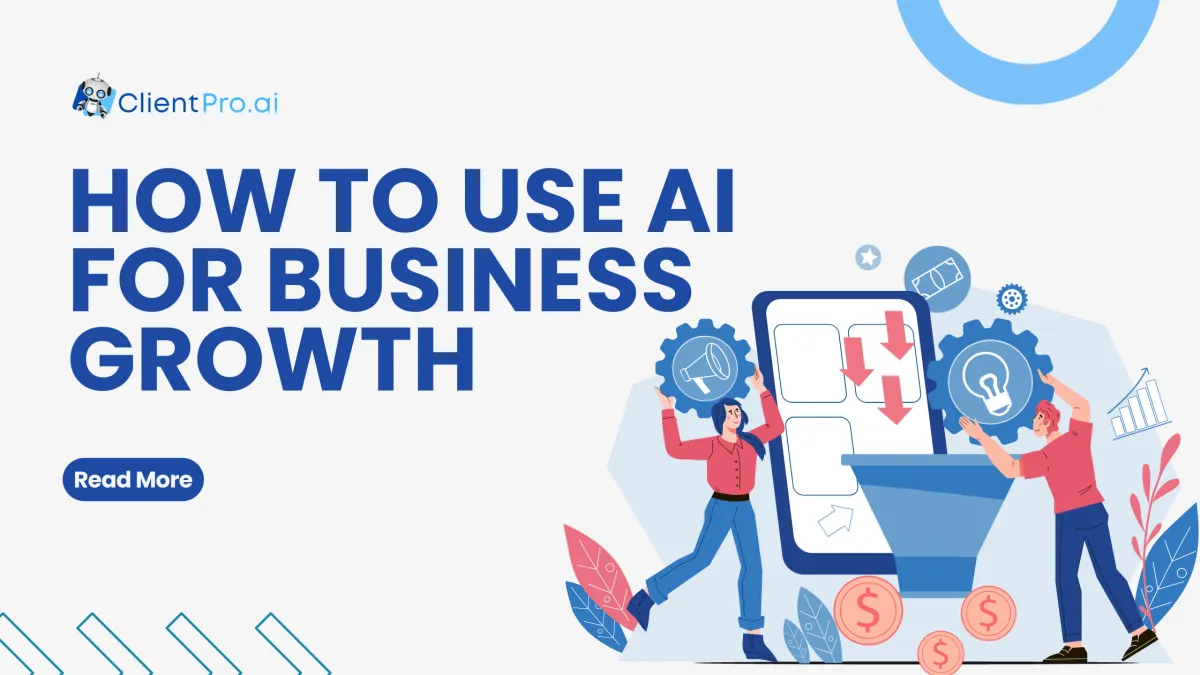Client Pro Blogs
Get Unlimited Leads With 'AI'
Download Our Free Ebook

How To Use AI for Business Growth
Introduction
The fusion of Artificial Intelligence (AI) with business strategies has heralded a paradigm shift in the entrepreneurial landscape. With its profound capabilities to analyze data, automate intricate tasks, and predict future trends, AI stands as a game-changer for businesses poised for exponential growth. In this article, we will explore into the nuanced methodology of utilizing AI not just as a tool, but as an integral accelerator for your business's upward trajectory.
Understanding AI in the Business Context
Before embarking on strategies, it's pivotal to understand what AI encapsulates. In the business echelon, AI is not just about robots; it's about algorithms, machine learning, and intelligent automation. It’s the driving force behind data analytics, customer interactions, and operational efficiencies, creating a streamlined, insightful, and proactive business environment.
The Spectrum of AI: From Automation to Prediction
AI's application in business spans across various functions and depths, from automating mundane tasks to predicting future market trends based on complex analyses. It transforms data into actionable insights, decisions into calculated predictions, and strategies into result-oriented action plans.
Infusing AI into Your Business Operations
The incorporation of Artificial Intelligence (AI) into business operations is akin to the symphony of a masterful conductor guiding an orchestra towards a crescendo of efficiency and innovation. More than just a technological addition, AI represents a transformative approach to how businesses operate, analyze, and grow.
Companies embark on this journey, they're not merely integrating tools but are weaving a fabric of intelligent systems that can autonomously make decisions, predict market shifts, and enhance customer experiences. The process involves understanding the nuances of AI capabilities, aligning them with specific business objectives, and iteratively refining them for optimum results.
By seamlessly melding AI into operations, businesses can achieve enhanced productivity, make data-driven decisions with unparalleled precision, and anticipate customer needs with astute accuracy. However, it's crucial to remember that this infusion is a dynamic process, demanding ongoing adjustments, learning, and evolution, ensuring that businesses remain agile, resilient, and at the cutting edge of their sectors.
Integrating AI into your business framework is not a one-time implementation; it's a journey that involves continuous learning, adaptation, and evolution. Here's how you can strategically embed AI into different facets of your business to spur growth.
Operational Efficiency: Automating for Productivity
AI can be a potent force in enhancing your business's operational efficiency. By automating repetitive, time-consuming tasks, AI frees up your workforce's time, allowing them to focus on strategic, creative, and decision-making roles that propel business growth.
Intelligent Automation: Redefining Task Execution
Leverage AI-driven tools for intelligent automation. These systems not only automate tasks but also learn and improve over time. They can be employed in data entry, customer service via chatbots, or even in managing your supply chain, ensuring precision and efficiency.
Predictive Maintenance: Proactive Problem-Solving
Implement AI-driven predictive maintenance in your manufacturing processes. These systems predict equipment failures before they happen, reducing downtime and maintenance costs, and prolonging equipment life.
Data-Driven Insights: Making Informed Decisions
In the era of big data, making sense of the vast volumes of data is paramount. AI shines in its ability to analyze complex data sets, providing businesses with insights that are humanly impossible to deduce.
Advanced Analytics: Unveiling Market Trends
Utilize AI’s advanced analytics to understand market trends, consumer behavior, and competitive analysis. This information is vital in shaping your products, marketing strategies, and even predicting future trends, giving you a competitive edge.
Personalization: Tailoring Customer Experiences
Employ AI to analyze customer data, enabling you to offer personalized experiences. From product recommendations, targeted marketing, to personalized content, AI’s ability to segment and understand customer preferences can significantly boost customer satisfaction and loyalty.
Innovative Product Development: Meeting Unarticulated Needs
AI's predictive abilities and data analysis can unearth needs your customers themselves might not articulate. These insights are invaluable in developing innovative products and services that meet these latent needs.
AI-Driven R&D: Pioneering Forward
Integrate AI into your research and development (R&D) initiatives. AI can rapidly process and analyze scientific data, predict outcomes, and even suggest directions for new research, significantly speeding up your innovation processes.
Strategic Marketing: Engaging the Right Audience
AI can revolutionize your marketing efforts through precise targeting, personalized content, and efficient spending. It’s about reaching the right audience, with the right message, at the right time.
Targeted Advertising: Precision in Outreach
Incorporate AI algorithms to analyze customer behavior and market trends, allowing for highly targeted advertising. This ensures your marketing budget is spent efficiently, reaching those most likely to convert.
Content Optimization: Speaking the Customers’ Language
Use AI tools to optimize your content strategy. From SEO to content creation, AI can identify what resonates with your audience, the type of content that drives engagement, and the optimal times for posting.
Navigating Challenges: Ensuring a Smooth AI Integration
Embarking on the journey of integrating Artificial Intelligence (AI) into business frameworks is akin to navigating through uncharted waters, filled with potential obstacles and unforeseen challenges. While the promises of AI are vast, from streamlined operations to groundbreaking insights, its seamless integration demands meticulous planning and foresight.
Among the myriad challenges faced by businesses are the intricacies of data management, ensuring robust data privacy, and addressing the looming skill gaps that AI technologies necessitate. Moreover, achieving a balance between human intuition and machine intelligence, while fostering an organizational culture that embraces this symbiosis, can be daunting.
Furthermore, initial financial implications and the need for significant infrastructural adjustments can also pose hurdles. However, with a strategic approach, informed decision-making, and a focus on continuous learning, these challenges can be transformed into stepping stones. Ultimately, ensuring a smooth AI integration is about foresight, adaptability, and a commitment to leveraging technology for sustained business growth.
While the prospects of AI are boundless, the path to its integration does come with challenges. Understanding and navigating these hurdles are crucial for a successful AI strategy.
Data Privacy: Balancing Insight with Confidentiality
With great data comes great responsibility. Businesses need to navigate the delicate balance between harnessing data for insights and upholding stringent data privacy and security standards.
Skill Gap: Cultivating an AI-Ready Workforce
The integration of AI demands a workforce skilled in data science, analytics, and AI application. Investing in training and development is key to building an AI-ready team.
Cost Implication: Strategizing for Long-Term Gain
The cost implications of integrating Artificial Intelligence (AI) into operations stand out as a prominent concern for many enterprises. The initial financial outlay for AI integration—encompassing technology acquisition, system upgrades, and skill development—can indeed be substantial.
However, it's essential to view this not as a mere expenditure but as a strategic long-term investment. By infusing AI into business operations, companies pave the way for enhanced efficiency, precision-driven decision-making, and the unlocking of innovative avenues previously deemed unattainable.
Over time, the returns on this investment, both tangible in terms of revenue and intangible in terms of market positioning and brand value, can far outweigh the initial costs. Consequently, businesses must adopt a forward-thinking perspective, understanding that the true value of AI lies in its potential to catalyze exponential growth and solidify a competitive advantage in an increasingly digitalized marketplace.
Initial AI integration can be costly. However, businesses need to envision this as a long-term investment that will yield substantial returns of efficiency, insights, and profitability.
The Future Powered by AI: Embracing a New Business Era
AI is not just another technology; it's a fundamental shift in how businesses operate, strategize, and grow. It's about creating systems that learn, adapt, and potentially think, working alongside human intelligence to create a more efficient, insightful, and innovative business landscape.
Sustainable Business: AI for Environmental Efficiency
Beyond economic growth, AI has significant implications for environmental efficiency. From optimizing energy use in operations to creating sustainable supply chains, AI is at the forefront of driving environmentally sustainable practices.
Global Collaboration: Erasing Geographical Boundaries
AI enables businesses to operate and collaborate beyond geographical boundaries. With real-time language translation, market analysis, and virtual collaborations, AI is fostering a global business community.
Continuous Evolution: The Learning Never Stops
AI is characterized by its inherent nature of constant evolution, ushering in waves of technological advancements at a pace previously unimaginable. For businesses aiming to stay at the forefront of their respective industries, this demands a perpetual commitment to learning and adaptation.
As AI systems evolve, they not only enhance their existing capabilities but also unlock new potentialities that can revolutionize how businesses operate, strategize, and innovate. However, to harness this ever-evolving power, companies must invest in continuous training, research, and development. Embracing a culture of lifelong learning becomes paramount.
This not only ensures that the organization remains technologically updated but also cultivates a mindset of curiosity and adaptability among its workforce. In an age where change is the only constant, the continuous evolution of AI serves as both a challenge and an opportunity, underscoring the imperative that the learning, indeed, never stops.
The realm of AI is ever-evolving. Staying abreast of these changes, continuously learning, and being adaptable are crucial for businesses looking to leverage AI for growth.
Integrating AI into your business is a transformative journey, replete with challenges, learning, and immense potential. It’s about strategically aligning AI capabilities with your business goals, creating a synergy that drives efficiency, innovation, and unparalleled growth. In this new business era, AI is not just an option; it’s an imperative for businesses poised for success in a digitally-driven marketplace.
Let’s get you growing. Without the growing pains.
Let’s get you growing. Without the growing pains.
Contact Us
Easily Integrates With Leading Apps





About Client Pro
Culture
Compare Client Pro
Customer stories
Products
Features
All features
Appointments
Automation
CRM
Ecommerce & payments
Email marketing
Integrations
Landing pages & forms
Lead management
Reporting & analytics
Sales pipeline
Text marketing
Resources
Events
What is a CRM?
Lifecycle Automation
LCA Assessment
Free email templates
Subject Line Generator
How-to guides
Blog
Partners
Find a partner!
Apps & integrations
Help & Support
New customer resources
Customer Support
Help center!
Training Academy
Client Pro Marketplace
Play & template library!
Culture
Compare ClientPro
Customer stories
Contact us
Features
All features
Appointments
Automation
CRM
Email marketing
Text marketing
Sales Pipeline
Integrations
Payments & Invoicing
Websties & Landing pages
Lead management
Reporting & analytics
Products
Basic
Pro
AI Agent
Resources
Events
Automation
Free email templates
How-to guides
Blog
Help & Support
Customer Support
Help center
Client Pro Training Academy
Marketplace
Data migration
Coaching & guarantee
Product updates
Partners
Become a partner
Partner portal
Apps & integrations



